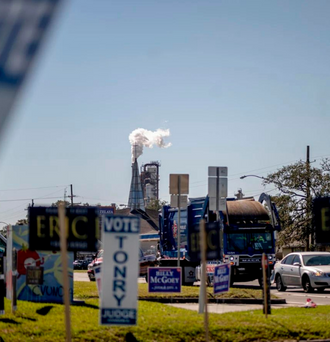
By Carlos Perez-Beltran and Nidhi Sharma
A nonprofit that looks to persuade people to vote with climate in mind has a new target: red states.
The Environmental Voter Project, which has worked since 2015 to rally voters around clean energy concerns, said Thursday that they are expanding their efforts into Louisiana and Nebraska, as well as a handful of purple states.
The move comes as climate change has become a bigger issue in U.S. politics, even if it remains split along party lines in terms of how the federal government should act.
Nathaniel Stinnett, the founder and executive director of the Environmental Voter Project, said they see an opportunity to bridge the partisan gap, noting that many Republican-led states are home to some of the worst climate-fueled impacts — and potentially the most significant opportunities for reform.
“These deep-red states actually have more climate leverage than most people think,” Stinnett said. “And Louisiana is particularly important for the climate movement because it’s ground zero for the U.S. fossil fuel industry. It’s where people are regularly dying from toxic air and water — and they need more political power as soon as possible.”
With this, the Environmental Voter Project is now on the ground in 19 states, identifying and connecting with nonvoting and seldom-voting environmentalists to have them play a more active role in the polls. Their researchers use data analytics and canvassing backed by behavioral science techniques.
Stinnett said the organization has helped convert over 1 million climate-conscious individuals into “super voters,” which is the project’s terms for people who reliably vote in federal, state and local elections.
In picking the new states, Stinnett pointed to the significance of Louisiana’s upcoming 2023 gubernatorial election, as well as the fact that utility regulators are publicly elected in both Louisiana and Nebraska. These officials are responsible for providing reliable and efficient energy to their customers and can play a role in promoting clean energy, according to the Environmental Protection Agency.
Stinnett said they hope these efforts will pay off in the 2024 election cycle. His organization plans to target 10 million voters expected to participate in 300 local and state elections across 19 states.
“Looking ahead, we know that the best way to make a new environmental voter in 2024 is to start talking to them in 2023,” Stinnett said. “ It’s always Election Day somewhere for the Environmental Voter Project, and we’ll use every election we can in 2023 to grow the power of the environmental movement.”
